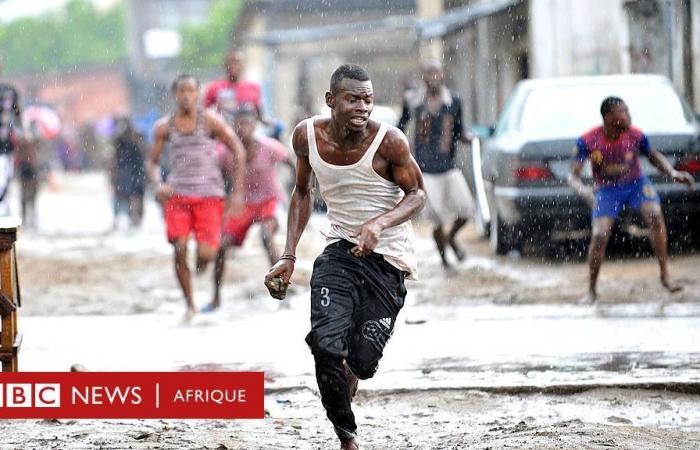Photo credit, Getty Images
- Author, Isidore Kourounou
- Role, Dakar
-
11 minutes ago
In the images in the local media in the Democratic Republic of Congo and on social networks, we see young people, staring into space, handcuffs on their hands, almost staggering, tears streaming down the faces of some, following a brief speech by the Congolese Minister of Justice.
Other images show them getting into a prison vehicle which should take them to a highly secure prison, far from Kinshasa, in the northwest of the country. This is the third wave which was transferred to secure prisons last Sunday, according to the authorities.
These young people, urban bandits called “kuluna” (lingala) in the DRC, had just been sentenced by the Kinshasa-Gombe garrison military court and are awaiting the execution of the death sentence decided by this court. “The police arrest, the justice system judges and sentences,” declared Constant Mutamba, Minister of Justice during a press briefing on Monday.
In Kinshasa and many other cities in the DRC, according to Billy Mbudi contacted by BBC Africa from the Congolese capital, residents can no longer stay outside after 8 p.m. The fear of these young bandits is very great among the population. “They’re not giving anyone a gift.”
“From the Ndolo military prison via Heavyweight Avenue to the N’djili international airport, the population gave a fierce ovation to the Minister of Justice, Constant Mutamba, whose effort to deal with the urban banditry is more than blatant,” wrote on
Who are the kuluna in the DRC?
“Kuluna”, which means major urban banditry in the DRC, refers to these young people organized into a gang of uncontrollable outlaws whose aim is to steal and cause harm with bladed weapons, generally machetes, knives and stones.
These young people justify their crimes by the fact that they do not have a job, and therefore turn to these abuses and crimes.
“They have no qualms, these young people who sow desolation and panic throughout Kinshasa and in other cities,” explains Mr. Mbudi.
A situation which leads to a major decision by the authorities
Photo credit, Getty Images
Most of these young people are repeat offenders who have already been in prison several times. But as soon as they leave, they begin acts of organized crime again by attacking honest citizens, according to the explanations of the Minister of Justice, Constant Mutamba.
“Imagine that a police officer has his arms cut off. These young people are killing people. When they fight with machetes, in any case you shouldn’t be there. It’s a bit horrible what they’re doing,” says Mr. Peter Ngomo Milambo, lawyer at the Kinshasa-Gombe Court of Appeal, to BBC Africa.
It was when overwhelmed by the situation that the Congolese authorities launched operation “Ndobo” (the hook). It is an operation, Constant Mutamba indicated during Monday’s press briefing, intended to curb urban organized crime in Kinshasa and other major cities in the country.
More than 300 kuluna were arrested and sentenced during 11 mobile courts.
“We were able to organize more than 11 mobile courts, and more than 300 Kuluna were sentenced. This means that these trials were organized on the basis of the legislative ordinance relating to the repression of flagrant offenses, to facilitate the speed of the procedures,” indicated the Minister of Justice who added that the rights of the accused have been respected.
127 of the 300 were sentenced to death. Others receive sentences of 5, 10 or 20 years. The procedure for a fair trial in accordance with the law was respected, according to Mr. Mutamba. The minister confirmed on Sunday the transfer of death row inmates from Kinshasa to the famous Angenga prison.
However, according to lawyers and other human rights organizations, there was a procedural defect during the first instance trial which resulted in the death sentences of these young people.
On the trial and the irrevocability of the death sentence
Photo credit, Me Peter Ngomo Milambo
Me Peter Ngomo Milambo does not think that these young people will be executed. “Otherwise it will be a serious violation of human rights.” For him, it is a way for the country’s authorities to scare them, given the crimes and other atrocities that these young people commit in the country’s big cities.
The lawyer indicates that the procedure was accelerated with formal defects. Recalling that offenses such as murder, criminal conspiracy, armed robbery are punishable by the death penalty according to Congolese legislation, it is difficult to establish in the case of kuluna, according to him, flagrance as if the facts for which they are judged to have just been committed.
“Most of them were sentenced to the death penalty. It is also true that there are some who confessed before the judge that it was I who killed such and such a police officer, it was I who killed such and such a person. But, this is not the case with everyone,” underlines the lawyer at the bar near the Kinshasa Court of Appeal.
He adds, however, that these young people were only convicted in the first degree. So the legal battle to get to their execution will be long.
Me Milambo recalls that according to article 61 of the Constitution of the DRC, “no matter the situation in which we may find ourselves, we cannot deprive anyone of their right to appeal”. And therefore those sentenced to death still have the right to appeal this decision.
Even if the sentence is confirmed on appeal, they still have the right to appeal to the Court of Cassation. If the procedure is followed, the lawyer continues, the execution of this death sentence “could not be completed in less than five years”. He deplores the passivity of defense lawyers who are not “equipped” or “sufficiently experienced” to know the procedure to follow.
And added: “Even if we reached a decision to appeal to the Supreme Court, there is still another procedure that would have to be used. The public prosecutor will have to contact the Head of State for a measure of pardon. It is only as a last resort, when the head of state refuses to grant pardon, that the death penalty can be carried out at this time.”
In the DRC, the death penalty for civilians is by hanging, and by shooting for soldiers. “But honestly, the procedure as followed was not at all regular. This is what we are denouncing,” according to Me Peter Ngomo.
He rejects reports that the young people on death row were brought in to be killed. “I don’t see anyone who can accept the responsibility of killing these young people, even though they are sentenced to death. Maybe it’s just to scare them a little.”
Some of these young convicts, according to him, even appealed. But judicial authorities insisted that they be sent first to these highly secure detention centers.
Call for respect for the rights of detainees
Photo credit, Getty Images
In a reaction on Tuesday, Amnesty International called on the DRC authorities to stop plans for mass executions in the death sentence of around 100 detainees, according to reports.
The human rights defense and protection NGO first protested against the transfer of detainees to Angenga, a prison located in the northwest of the Democratic Republic of Congo. “A prison where dozens of inmates have died of hunger and disease in the past.”
“The announcement of these transfers is absolutely dismaying. We fear imminent executions, amid a lack of reliable information on the status of those convicted,” said Sarah Jackson, Deputy Regional Director for Eastern and Southern Africa at Amnesty International.
The organization requests that those transferred be placed in a facility accessible to lawyers, families and human rights organizations.
For his part, Constant Mutamba announced the construction of a new central prison in Kinshasa, with a capacity of 20,000 inmates, as well as in Kisangani, Goma, Bukavu and Sake. These projects, according to the minister, aim to relieve congestion in existing prisons and improve prison conditions, after the deadly incidents in Makala in 2024.
But he justified these transfers as a step in the execution of the death penalty, authorized by Congolese laws. The Minister of Justice also welcomed a reduction in banditry in Kinshasa thanks to these measures.
Last year, the DRC reinstated the death penalty after two decades of suspension. Death sentences have increased since then.






